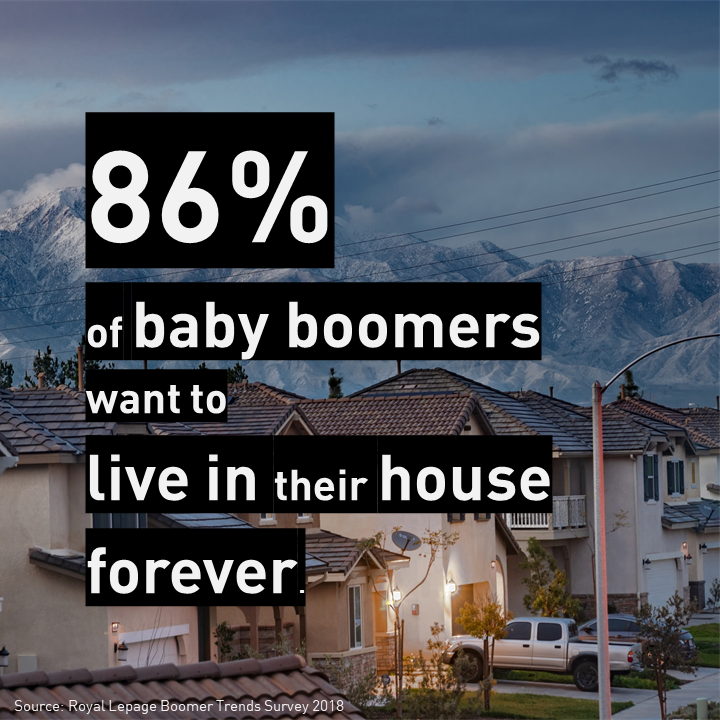Most Canadian Baby Boomers Unlikely to ‘Age-in-Place’
The average Canadian still retires at 65 - a milestone most Baby Boomers will have achieved in less than 5 years. The majority plan to live in their houses during retirement, but very few of them have sound enough finances to make that work for very long.
Most Boomers Will Have Retired Within 5 years
In 2019 baby boomers—born from 1946 to 1964—accounted for nearly a quarter of the Canadian population (24%).
The oldest baby boomers are 74 years old and mostly retired. Young-middle baby boomers 56 to 65 years old will soon reach the traditional retirement age as well.
From 1991 to 2011, the percentage of seniors (over the age of 65) in Canadian communities rose from 11% to 15%. According to Statistics Canada's most recent population projections, seniors could grow from 17.5% of the Canadian population in 2019 to 22.7% in 2031.
With many baby boomers delaying retirement and living longer, they will continue to shape Canada’s real estate market for the foreseeable future.
86% Want to ‘Age-in-Place’ but Fewer than 25% have Enough Retirement Savings
Most people anticipate they will retire at 65. But, while age certainly plays a vital role in the timing of retirement, changes in economic conditions and the rise of the digital workplace are now factors influencing boomers’ ability to choose their retirement age.
Traditionally these recessions follow the business cycle, and adoption of digital work practices would be incremental. The coronavirus pandemic has caused an off-cycle recession and triggered an abrupt digital transformation of the workplace. These changes are transforming the workforce and leading to a record number of business failures and job losses.
While millennials are caught in the second major recession of their early careers, boomers have the potential to be disproportionately affected by ‘forced retirements’ before reaching their desired level of savings.
This raises the question: How will the COVID-19 pandemic affect baby boomers’ retirement savings and financial security? To answer this question, it is useful to examine the current state of baby boomers’ retirement plans.
Retirement planning is not a one size fits all exercise because a lot depends on retirement lifestyle goals and saving and spending habits. Nevertheless, many baby boomers will be forced to consider alternative retirement plans.
Generally, retirees use a combination of three primary cash sources to sustain them through their golden years:
Savings
Continue Working
Home Equity
Savings: High Cost of Living Has Prevented Boomers from Saving Enough
Saving for retirement should start years before an individual intends to retire. But, due to the high Canadian cost of living, 36% of boomers admit they started saving for retirement later in life.
Many baby boomers’ investment portfolios are still recovering from the Great Recession and, today, the low interest rates used to combat the Coronavirus Recession are stunting investment growth.
Scotiabank’s 2019 Retirement Survey reveals that while 64% of Canadian baby boomers are currently saving for retirement, 75% are unsure if they will be able to save enough. The savings shortfall is a significant issue for the 44% of Canadian women fear they will struggle to pay for basic necessities during retirement.
To fill the savings shortfall, many baby boomers will try to work longer.
Continue Working: Boomers’ Job Prospects are Challenging in a Digital, Remote-Working, Post-COVID World
Baby boomers can plug the hole in their retirement savings by delaying retirement or returning to the workforce.
Very Few Retirees Successfully Return to Work
Although many boomers believe they can continue to work beyond 65, this goal usually isn’t achievable. A 2019 survey by RBC, Retirement Myths and Realities, found that 50% of pre-retirement boomers plan to work in retirement, but only 11% of surveyed retirees actually return to full or part-time work.
Ways-of-working are Changing
Social-distancing measures in Canada could last 12 To 18 months. During that time businesses will accelerate a digital transformation that normally would progress over a decade. Most people are familiar with Facebook, Instagram, TikTok, and LinkedIn, but not very many are familiar with the business side of these platforms. Likewise, many people have experience using Facetime with their friends and family, but this is much different than planning and facilitating an emergency business meeting on zoom to drive a critical business decision.
Research by the Brookfield Institute suggests that engagement of the elderly (65+) in digital literacy practices has historically been focused more on social inclusion than on the workplace as many have reached retirement age. This might make it increasingly difficult for them to continue working to supplement their retirement savings unless they can, and want to, navigate the new norm of digital, remote-working.
While baby boomers may not be as tech-savvy as younger generations, the basic features of remote working tools, like Slack and Zoom, are incredibly easy to use and shouldn’t present much of a barrier to most boomers who want to continue working. Translating forty years of face-to-face relationship building, sales ‘chutzpa’, soft-skills, and leadership presence into a digital business realm may present bigger challenges.
For some boomers, the flexibility of working from home could allow them to prolong retirement for a few years to top-up their savings. For boomers in careers that are not suitable for remote work, the picture becomes more complicated. Statistics Canada estimates that only 40% of Canadians can feasibly perform their job from home.
Boomers with savings shortfalls that are unable to continue working will need to take a careful look at the cash tied up in their homes.
Home Equity: How do you age-in-place when your home is your greatest asset?
The next best option for baby boomers to maintain a comfortable lifestyle in retirement is selling their house. Unfortunately for house-rich and cash-poor boomers, selling their home means letting go of their dream to remain in their current home.
What do boomers want to do with their houses?
Canadian Preferred Retirement Living 2018
The vast majority of boomers want to ‘age in place’. However, while 86% of boomers across Canada’s four largest cities want to live in their current homes for as long as they can, just over one-third acknowledge they are likely to sell and move to a new private residence within their lifetime.
If you know you’re going to sell, does the timing matter?
Home Prices Are Forecast to Fall
CMHC has forecast Canadian home prices will drop between 9 and 18 percent over the course of the recession.
Mortgage Sandbox expects the recession to reduce home values between 10% and 50%, depending on the local market. Like the Great Recession, values will probably not return to pre-COVID levels for two years or even a decade.
In the past, home prices rose consistently every year. Now that there is more uncertainty in real estate markets, it is time for baby boomers to look critically at the timing for the eventual sale of their home. They can sell now near the peak of this real estate cycle, or they may have the financial resources to wait until the market conditions become more favourable.
Our view is that ‘downsizing’ or ‘right-sizing,’ as we prefer to say, is the most likely solution because it allows boomers to access retirement savings locked in their homes, stay invested in real estate, and move into high-end condos with all the amenities and none of the maintenance work.
The House Premium is Dropping
A majority of Canadian boomers own houses. So, in the coming years, there will be an influx of house supply on the market.
But who has the money and desire to buy them?
The price gap between house and condo prices widened dramatically. In September 2005, the Benchmark Canadian house price was $298,700 and the benchmark condo was $202,700—roughly a $100k gap. At the peak in 2016-17, a Millennial upgrading from their starter condo to a house in Vancouver or the GTA would need to come up with an extra one million or half a million to take the leap. Upgrading from a condo to a house is unachievable for many Millennials.
Recently, in Toronto and Vancouver, the gap increased to a daunting $360K and $770K.
In 2018, the Banking Regulator implemented a stress test that reduced homebuyer budgets by roughly 20%. Beginning July 1st, the Canadian Housing and Mortgage Agency (CMHM) has made changes to its mortgage qualification requirements that result in as much as a 10% hit to homebuyers’ budgets. The 30% drop in home buying budgets combined with lingering unemployment from a Coronavirus Recession are significant barriers for homebuyers.
Since the peak, the value gap has begun to shrink. This will help Millennials who want to buy a larger home, but it also reduces the cash-out for boomers when they right-size to a condo. A recent study by the University of Arizona predicts millions of American homes could become unsellable - or could be sold at significant losses to their senior-citizen owners - between now and 2040. It is certainly possible that a similar scenario plays out in Canada as well.
Downsizing in Early Retirement can Prolong your Life
It’s well known that many older individuals suffer from stress and anxiety when they move to a new home in their twilight years.
At the same time, our bodies are more prone to injury as we age. According to the Alliance for a National Seniors Strategy, for instance, 20 to 30 percent of seniors fall annually, threatening their independence, general well-being and often resulting in hospitalizations and rehabilitation programs. Right-sizing to a single level apartment where a property manager takes care of roof maintenance surely helps avoid injury.
Some boomers have already sold their house and traded it for an apartment in Canada and another apartment somewhere sunny. Many more boomers could begin to view right-sizing in early retirement favourably due to its potential to improve their health and lifestyle.
What are some other options for boomers?
Some probably less desirable options boomers who have fallen short on their retirement savings are:
Getting a high-interest reverse mortgage
Renting out part of their home to subsidize their income
Move-in with their children
Apply for government-subsidized senior housing
What should baby boomers do?
The Coronavirus Recession is further complicating retirement plans. With the prospects of ageing-in-place and continuing to work in retirement facing new challenges, many of you will need to assess the financial, health and lifestyle benefits of selling your home. This means the time may be right to down-size into a condo before the forecasted drop in both house prices and the house premium.
Consult a Financial Planner
Before making a final decision, consult a financial planner to update your retirement savings plan to fit your specific situation.
Financial planners can help unlock value from your homes and determine your spending needs in retirement.
If you have a savings shortfall, discuss different options. Ask them to look at the House-Condo Value Gap in your area and ask them for a recommendation on when to right-size.
Is now a strategic time to sell? Find a Digitally Savy Realtor
Now more than ever, you need a real estate agent who has full mastery of the digital real estate sales toolbox.
Read: Top Real Estate Trends Coming Out of the “Great Lockdown”
Our easy to use online app can connect you with local, pre-screened professionals, who share your interests, values, and have a complementary work style. Learn More
Answer 10 simple questions and get introduced to professionals who are predisposed to work well with you. We believe aligned values lead to better working relationships and a more successful home buying experience.
Need a great Realtor?
Our app matches you with local pre-screened, values aligned agents.
Good luck and good skill!
We hope this information will help you make better housing decisions. Please try our app to help you find a great local mortgage broker and Realtor.
Like this post? Like us on Facebook for the next one in your feed.







